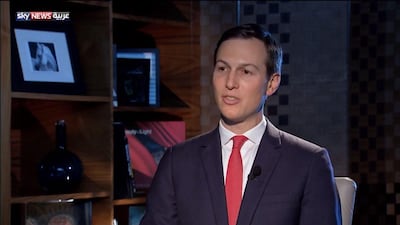The long-awaited US peace deal for the Palestinian-Israeli conflict will seek to resolve border issues and promote freedom of religion, White House senior adviser Jared Kushner said on Monday.
US President Donald Trump promised to find a solution to end the decades-old conflict, but details of the plan worked on over the past two years have yet to be made public.
"We have been trying to formulate a realistic and just solution to these issues that will allow people to live a better life," Mr Kushner told Sky News Arabia in Abu Dhabi.
Transcript: Read the interview in full
“We focused on four core principles. The first is freedom, where we want people to enjoy their rights of opportunity, religion and worship, regardless of their beliefs, as well as respect.
"The dignity of people should be safeguarded. They should respect each other and benefit from opportunities to improve their lives without allowing conflicts to jeopardise their children’s future and security."
Accompanied by US Middle East envoy Jason Greenblatt and US envoy on Iran Brian Hook, Mr Kushner will also stop in Oman, Bahrain, Saudi Arabia and Qatar.
Mr Kushner, who is also Mr Trump's son-in-law, said the White House would like to see a unified Palestine, instead of the current situation in which Gaza and the West Bank are separated.
“The political plan is very detailed and focuses on resolving the border issue, and if we can resolve this factor and bring peace away from intimidation, then we can guarantee people’s freedom,” he said.
The Palestinians have pre-emptively rejected the plan. President Mahmoud Abbas said he would not negotiate with the US after Mr Trump’s controversial decision to recognise Jerusalem as the capital of Israel in December 2017.
“We have not been able to convince the two sides to make concessions," Mr Kushner said, adding that the administration has focused on the integration of the Palestinians with the Israelis.
"If we look at the entire region today, we see that there are a lot of opportunities, and great threats in return, and by bringing together the different parties we hope to find a new approach."
Washington’s stance on Jerusalem, which included moving the US embassy from Tel Aviv to the city, overturned decades of US policy that promised the city’s status would be decided only through joint negotiations. It drew condemnation from Arab leaders and widespread criticism elsewhere.
The US president also declared that his administration would no longer fund the UN Relief and Works Agency for Palestine Refugees, reversing a policy supported by every American leader since the organisation was created nearly 70 years ago.


